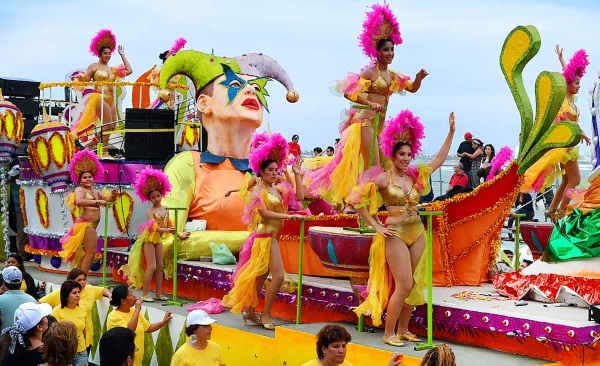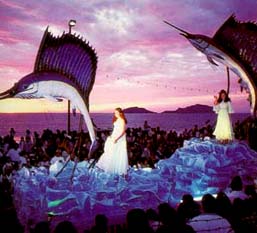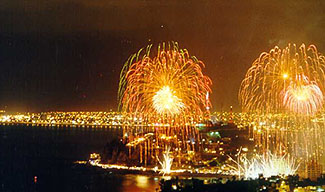|

Carnaval is February 8th - 13th, 2024
Carnaval is an official Mexican holiday that kicks off a five-day celebration of the libido before the Catholic lent begins on Ash Wednesday. Beginning the weekend before Lent, Carnaval is celebrated exuberantly with parades, floats, costumes, music and dancing in the streets. Carnaval is equivalent to Mardi Gras in New Orleans.
 History
History |
The festival of Carnaval is celebrated as a last indulgence of carnal pleasures that Catholics must give up for 40 days of fasting during Lent, from Ash Wednesday to Easter Sunday. In fact, the word Carnaval is derived from Latin, meaning take away or goodbye to flesh, and strict Catholics will give up meat eating during Lent.
Carnaval is officially celebrated for 5 days, leading up to Ash Wednesday, with the most vigorous celebration taking place over the one weekend in Mexico. The wearing of masks during Carnaval is said to be a pagan practice as protection from evil spirits, but most likely evolved as a way to participate fully in the celebration with some anonymity.
 Where To See It
Where To See It |
 In Mexico, many cities have Carnaval celebration of various sizes, but the biggest events take place in the port cities, with the largest of all in Mazatlan. Mazatlan's Carnaval is said to attract well over 300,000 people, making it the third largest such event behind Rio de Janeiro and New Orleans. Port towns such as
Cozumel, Ensenada, La Paz and Veracruz are also excellent places to watch Carnaval festivities.
In Mexico, many cities have Carnaval celebration of various sizes, but the biggest events take place in the port cities, with the largest of all in Mazatlan. Mazatlan's Carnaval is said to attract well over 300,000 people, making it the third largest such event behind Rio de Janeiro and New Orleans. Port towns such as
Cozumel, Ensenada, La Paz and Veracruz are also excellent places to watch Carnaval festivities.
People from all over the world come to Mazatlan to enjoy the festivities, and this is one of the few times that hotel reservations are both necessary and more expensive. If you plan to attend, make sure you have arrangements in place several months in advance.
 Festival Events
Festival Events |
During Carnaval, everyone participates in the many events and activities that make up the celebration. Wherever Carnaval is celebrated the whole town parties during the day and into the night, dressed in their masquerade outfits, enjoying food and drink and liquor. People of all ages throw and break cascarones, confetti filled eggshells, over each other. There are many booths that offer food, drinks, snacks and games and crafts of every type. Music of all sorts is played non-stop, by live bands, DJs or the boom box.
Some Carnavals also have a collection of rides like those found at an amusement park. Depending on the town, there may be many organized parties, outdoor festivals and masquerade balls. Many of these types of events charge an entrance fee, or may be entirely private. Mazatlan hosts a public street fair and dance for a small admission, as well as on offshore fireworks display that commemorates an old naval battle.
During the final days, many different events present awards, one for the Flower Queen, and literary awards to those who have written the best Flowery Poem. In Mazatlan, a prestigious national award is presented for the best unpublished literary work from anywhere in Mexico, called the Clemencia Isaura Poetry award.

The traditional fireworks display above Mazatlan's coast
In the evenings there are fireworks displays including the traditional castillo, or castle, a large fireworks platform unique to Mexico. Even the kids get to stay out until late to take part and enjoy the festivities. On Saturday evening, there is the coronation of the Carnaval Queen and the humorous El Rey Feo, or Ugly King. There will also be the burning of an effigy, usually someone unpopular at the time, known as the Quema de Mal Humor or Burning of Bad Humor.
Sunday is the biggest organized celebration of the weekend, and typically includes the big float parade, and lots of musicians playing on stages and dancing in the streets. When Monday arrives, there is El Dia del Marido Oprimido, or the Day of the Oppressed Husband. On this one day, for 23.5 hours, husbands have the freedom to do as they wish ... within the law and religious faith of course.
By the time Fat Tuesday rolls around, many people have to get back to work, and just about everyone has had their fill of revelry and indulgence, ready to accept the restrictions of Lent..
If you're looking for a festival of dancing, costumes, music, fireworks, food, drink and just being wild and crazy ... then Carnaval is the holiday for you. And Mexico certainly knows how to celebrate this holiday in style.
|

